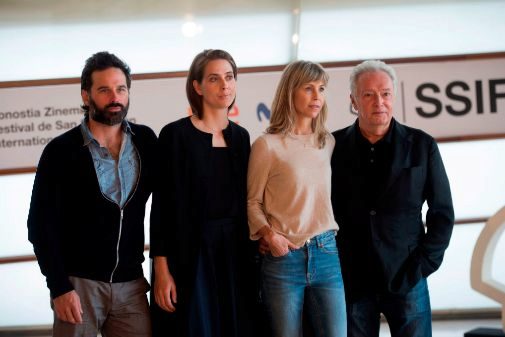- Zinemaldia, James Franco, the worst of all
Jonathan Swift suspected the ambition for the graphic and obvious stance that he has to adopt: little difference to someone who crawls from someone who climbs. But it is fair to recognize that the desire to achieve something difficult, that is ambition, forces us to look at the sky. And that, at the very least, clears the view and even swells the lungs. The three films competing on Tuesday, in their shared character of taking the opposite of the obvious, have at least the courage to want to breathe and look differently. Up always. Ambitious therefore.
'And rained birds', by the Canadian Louise Archambault , proposes a drama in the exact place where the cinema rarely stops: in old age one step away from death. And just for that, his manners are radically unique. Yes, debatable and even failed, but completely different. At his side, the Chilean José Luis Torres Leiva dares in 'Death will come and will have your eyes' with a story that, in the same way, has nothing to do with the territory of the common: the love of two women facing the terminal disease of one of them. The third to appear was the American Paxton Winters with a story very far from himself and very close to the Sundance Institute from which it comes: 'Pacified' runs in the favelas of Rio and in the timely description of daily violence sinks the possibility of a different future. Otherwise, three tapes that, ambitious, climb.
The most striking of all is the first cited. And it is because of his suicidal vocation and his willingness to move without prejudice through the most dangerous and unstable areas of melodrama. Archambault proposes in his third feature a reading of the mechanisms of emotion from the utmost nakedness. Without prejudice and in a completely virgin land. Already all passions are things of the past and the only thing that is talked about is the memory of a time of oblivion and destruction.
A photographer approaches the shelter in the middle of the forest of three old hermits. His idea is to document the physical and other traces of a great disaster: a fire that once devoured everything. On this starting point, the idea is to compose a story of heartbreak that is also madness (along the way an octogenarian will appear since childhood against her will and unfairly in a psychiatric hospital). Not a frame is risk free. It is about teaching what is usually denied to the look: the naked and old bodies that love each other (and, in the certainty of vulgarity, fuck) and the clarity of an agonized and conscious suicide. That said, the virtue of the different is appreciated.
It is true that, between so much radical stance, the director, at times, is limited to the comfortable and almost childish resource of opposing. Far from dismantling the most obvious rules of the drama, it exacerbates them and, in its effort to extreme each gesture, ends up confusing the sublime with the ridiculous. But, as we say, it never crawls, always up. Although it hurts, although, at one point, everything simply collapses.
The Chilean long-term proposal of Torres Leiva being radically different from the previous one ends up breathing the same sensation of vertigo. 'Death will come and you will have your eyes' opt for the distance in 'off' to portray the closest. And in that game of paradoxes and confused distances he achieves a beautiful and even calculatedly slight approach to the most serious . The film is offered and works as a beautiful love poem to the very limit of death. Sparkly. Perhaps the only criticism is the tendency to celebrate the occurrence. The mechanism is so effective and so simple that the director can not help but recreate in an unhealthy complacency. And that, at times, becomes irritating. Even if it's just a little; Although it is hardly a touch. Be that as it may, it gains the clarity and beauty of a voice, again, perfectly different.
The case of 'Pacified' no longer admits the possibility of further stretching the metaphor of ambition. Or not so much. Winters stops in the eyes of a teenager and from that impregnable watchtower tell a common story of violence. In the contrast of the two worlds, the transparent one of the protagonist and the essentially murky that surrounds her, the fate of a film that already makes her own the models of a cinema that from 'City of God' has perhaps become in gender. Despite the erratic and even free of the script, the film advances confident by the scheme of a 'thriller' that at the same time is tragedy and denunciation. It matters the commitment of a look that, again, is intended and wanted new. Without a doubt, effective.
When Borges was asked, always he, what was his ambition, replied that writing something that is all for all men. And he continued: "That it may arise in Buenos Aires as it might have arisen in Oxford or in Pergamum; may it not feed on my hatred, on my time, on my tenderness; may it keep (for me as for all) a changing angle of shadow; that corresponds in some way to the past and even to the secret future; that the analysis cannot exhaust; may it be the rose without reason ... ". And, without more precision, he left it there. Against Swift, not all ambition is vile. Well, that.
According to the criteria of The Trust Project
Know more- culture
- movie theater
CinemaSex, lies and Harvey Weinstein
Cine 'Dolor y gloria', by Almodóvar, will represent Spain at the Oscars
Documentary 'The exorcist': the encounter of a crucifix and a vagina

